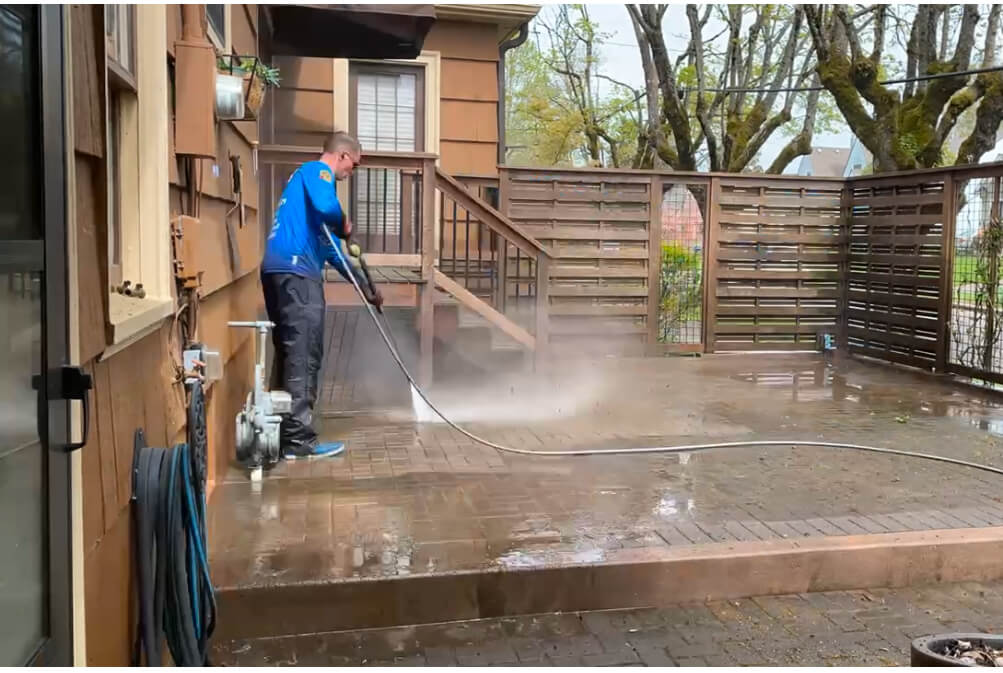Key Takeaways
- Wood and vinyl fences have different care requirements.
- Harsh weather in Oregon can accelerate grime buildup and wear.
- Professional pressure washing can preserve the beauty and extend the life of your fence.
- Seasonal upkeep plays a key role in fence longevity.
- Peak Pressure Washing provides safe, efficient cleaning tailored to your fence type.
Fences are more than just boundaries—they contribute to curb appeal, security, and overall property value. But exposure to the elements means they collect dirt, algae, mildew, and discoloration over time. Whether you own a traditional wood fence or a low-maintenance vinyl one, proper care is essential. And while occasional rinsing might help, comprehensive maintenance requires a deeper approach.
In this guide, we break down the unique needs of wood and vinyl fences and explain why professional services are the most effective way to preserve your investment.
Understanding the Differences Between Wood and Vinyl
Wood Fences:
- Prized for their natural look but highly susceptible to moisture.
- Can develop rot, mold, and mildew if not cleaned and sealed regularly.
- Require gentler pressure to avoid splintering or fiber damage.
Vinyl Fences:
- Resistant to moisture and insects but can become stained from algae, grass clippings, or UV exposure.
- Over time, discoloration and surface build-up affect their visual appeal.
- Require different detergents and pressure settings than wood.
Knowing these differences is the first step. Applying the wrong technique or using incorrect pressure can do more harm than good.
The Hidden Cost of DIY Fence Cleaning
Many homeowners attempt to clean fences using over-the-counter detergents or garden hoses, but this often leads to incomplete cleaning or surface damage. In wood fences, aggressive scrubbing or high PSI pressure washing can gouge the surface and strip away protective sealants. For vinyl, the wrong products can leave residues or dull the finish.
Additionally, DIY cleaning usually skips preventive care like sealing or UV protection, which plays a significant role in extending a fence’s life.
Rather than risking damage or ineffective results, entrusting professionals who understand the proper methods and safety protocols ensures better results without compromising the material.
What Professional Fence Cleaning Involves
At Peak Pressure Washing, each fence material is treated with the right combination of technique, detergent, and pressure. Here’s how our process benefits your property:
- Soft Washing for Wood: Low-pressure washing paired with eco-friendly cleaning agents to remove mold, algae, and dirt without damaging the surface.
- Targeted Vinyl Cleaning: Specialized detergents lift stains and kill mildew without corroding or scratching the surface.
- Post-Cleaning Treatments: Wood fences benefit from sealing to prevent moisture infiltration, while vinyl fences can receive a UV protectant spray to prevent yellowing.
The result is a fence that not only looks better but is also protected against future damage.
Fence Longevity Starts with the Right Maintenance
Properly maintained wood fences can last around 15 years, while vinyl fences can exceed 25 years with regular care. However, this lifespan can be cut in half without proper upkeep.
Oregon-specific concerns:
- Rain and humidity increase mold and algae risk.
- Falling leaves and pine needles create buildup around the base of fences.
- Winter freezes can worsen cracks or weaknesses in older wood structures.
Regular professional cleaning, especially before and after wet seasons, helps mitigate these problems.
When and How Often Should Fences Be Cleaned?
A seasonal cleaning routine is ideal:
- Spring: Remove winter buildup and inspect for moss or discoloration.
- Summer: Keep surfaces clear from pollen, sap, or lawn care stains.
- Fall: Prepare fences for the rainy season by clearing leaves and sealing wood.
- Winter: Spot checks after storms to prevent debris from causing moisture retention.
For most properties, a professional cleaning once or twice a year is sufficient. However, heavily shaded or landscaped areas may require more frequent care.
Common Fence Cleaning Myths
- “Vinyl doesn’t need maintenance.”
False. While it’s low-maintenance, it can still develop mildew or fade from UV exposure. - “Pressure washing always works.”
Not exactly. High pressure can damage wood or even crack vinyl if misused. Professional calibration is key. - “Eco-friendly cleaners aren’t effective.”
Not true. Many professional-grade biodegradable cleaners are highly effective without the risks associated with bleach-based products.
Why Work With a Professional?
Hiring a trained fence cleaning professional saves time, protects your materials, and ensures thorough results.
Benefits include:
- Accurate pressure settings for each material.
- Detergents that lift stains without stripping finishes.
- Safer, faster, and more effective outcomes.
Peak Pressure Washing brings local expertise, eco-conscious methods, and tailored service to every job.
Restore Your Fence With Peak Pressure Washing
Keeping your fence clean is more than a cosmetic concern—it directly impacts your property value, safety, and long-term costs. Instead of guessing which cleaner or nozzle to use, let Peak Pressure Washing handle the job with precision.
Whether you have a rustic wood perimeter or a sleek vinyl border, we tailor our services to your material and your goals. Reach out today and experience the difference professional fence cleaning can make.

